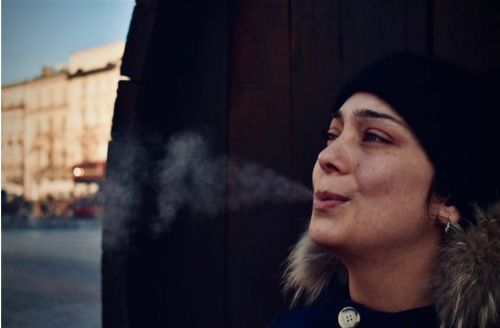Yes, Your Breath Can Get Worse During Colder Months—Here’s Why and How To Deal
When it gets colder out, you might notice that your breath odor has changed. Here's the reason for wintertime bad breath and how to fix it.

If you live in an area that gets colder during the winter, it’s probably not hard to imagine walking home, wrapped in a coat, with puffs of your breath visible in the cold air. Though you can sometimes see your breath in the wintertime, you probably don’t want to smell it. Sadly, your wintertime bad breath happens for a handful of reasons—but there are ways to deal with it.
Experts in This Article
board-certified dentist
dentist
dentist and the founder and CEO of Les Belles NYC
If you have a penchant for strong-tasting foods like coffee, garlic, or bleu cheese, you might worry that’s what’s causing your wintertime bad breath. Although these ingredients, and your impeccable taste in food, can cause your breath to take on undesired odors, there are winter-specific reasons for bad breath. “The most common cause of bad breath is the billions of bacteria that live on your gums, teeth, and tongue,” says Sharon Huang, DDS, MICOI, of Les Belles NYC. “In the winter, the cold weather takes away the moisture in the air, which in turn makes our mouth dryer. When the mouth is dry, it is a prime breeding ground for bacteria,” says Dr. Huang. You may think the solution is finding refuge by staying warm inside, but this dryness goes for the indoors and outdoors during this time of year.
“Saliva is nature’s way of keeping the mouth moist and also helps keep the mouth clean by washing away bacteria inside the mouth,” says Joyce Kahng, DDS, and clinical assistant professor of dentistry at USC. “When the weather becomes cooler, and we start turning on our heaters, the air becomes drier, and there is less of a natural self-cleansing mechanism we usually get from saliva.”
Not only is the air dryer inside and out during the winter, but you also might find yourself drinking less water than you do in the summer. Adrienne Hedrick, DDS, says that sweat evaporates quicker in cold temperatures because of the reduced moisture in the air. Additionally, winter air may not make you feel as thirsty as hot air tends to do. These factors increase the likelihood of dehydration.
Although all of these dentists mentioned that diet impacts the breath, most highlighted the importance of hydration and dental hygiene over specific dietary changes. “People usually think bad breath is always a result of things they ate. However, most of the time, it’s caused by something else such as being dehydrated or having gum disease,” says Dr. Hedrick.
Beyond drinking water, which sometimes seems like the answer to everything, there are some dental hygiene techniques that can help, as well. Dr. Huang recommends that you floss and brush your teeth and gums twice a day. All of the experts recommended brushing and flossing to reduce the amount of bacteria in the mouth because it really is that effective. She also says that people concerned about bad breath should consider using a tongue scraper twice daily, too. Tongue scrapers are less commonly recommended but super helpful when it comes to fighting bad breath. Dr. Kahng seconds this sentiment and adds, “The white stuff people see on the tongue is an accumulation of bacteria, debris, and dead tongue cells that need to be exfoliated. Tongue scraping done gently and properly does not damage tastebuds, but excess pressure can.” These manual techniques work to rid your mouth, teeth, tongue, and gums of odor-causing bacteria.
Mouthwash might be another solution (pun intended) as long as it has the right ingredients. The type of mouthwash you choose can either help or hurt matters, according to Dr. Huang. She recommends that you choose an alcohol-free mouthwash. This is because alcohol is a very strong astringent that strips the mouth of bacteria and saliva, Dr. Huang says. Bacteria is what you want to get rid of; saliva, however, is not. Saliva is the valuable odor-preventing substance that you’re working hard to protect year-round. Antibacterial mouthwash without alcohol can have the desired bacteria-killing effect you’re looking for, without the alcohol that will dry your mouth out further.
At the end of the day, breath odors are simply an indication of something happening in your mouth—they aren’t a moral failure. In fact, if you notice unusually odorous breath despite following the recommended dental hygiene practices—something else could be afoot. “If you are regularly brushing your teeth, flossing, and rinsing your mouth and you still have bad breath, that’s a sign to seek help from a dentist,” says Dr. Kahng. “The bacteria causing the bad breath may be in your throat or tonsils. If you have any pain or gum tenderness, that’s also a sign to seek help.”
Oh hi! You look like someone who loves free workouts, discounts for cutting-edge wellness brands, and exclusive Well+Good content. Sign up for Well+, our online community of wellness insiders, and unlock your rewards instantly.
Sign Up for Our Daily Newsletter
Get all the latest in wellness, trends, food, fitness, beauty, and more delivered right to your inbox.
Got it, you've been added to our email list.










